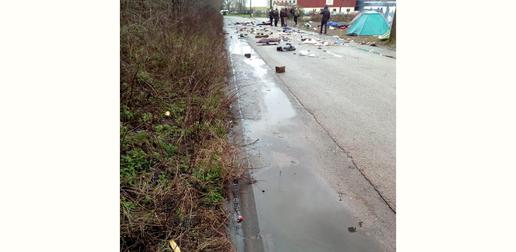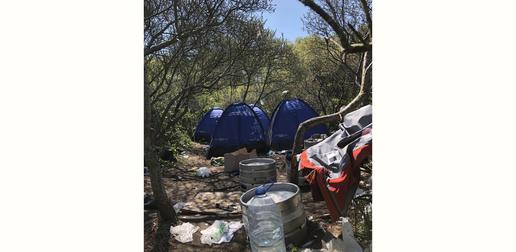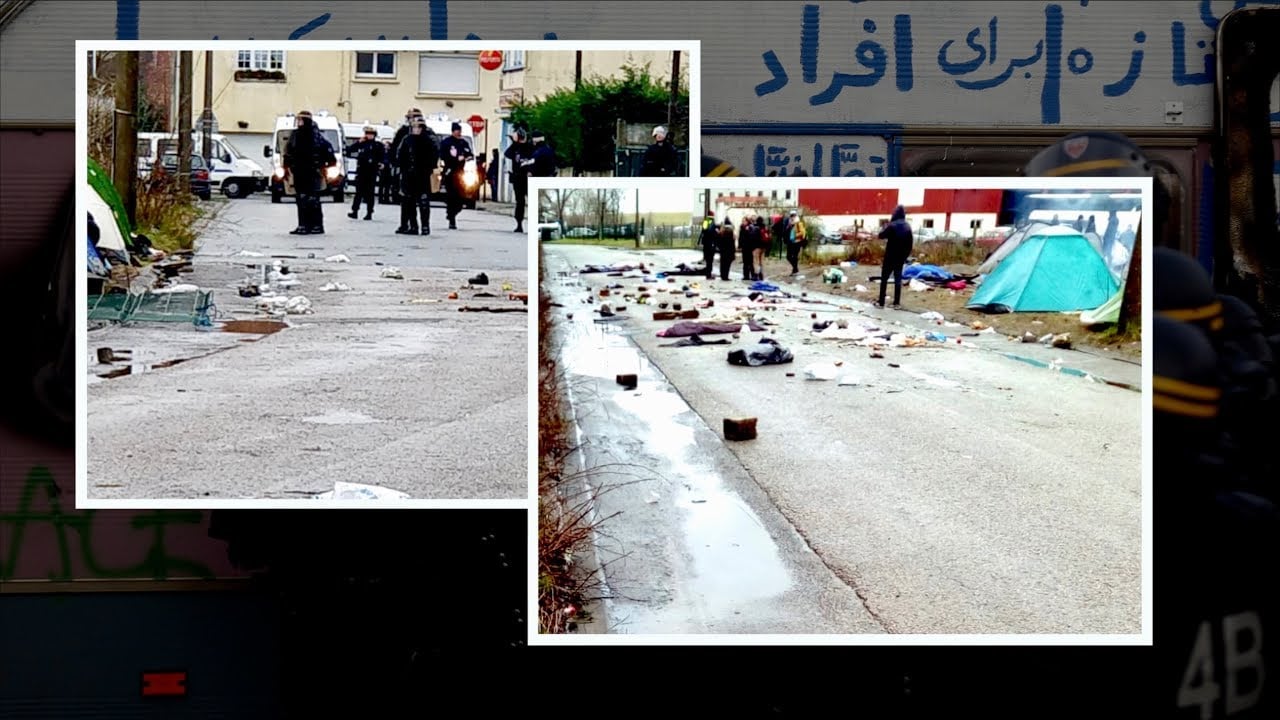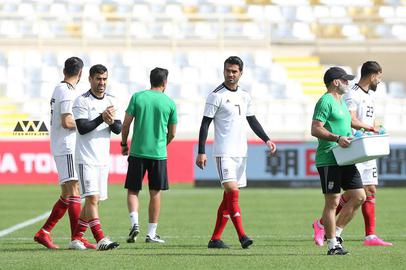On the morning of Thursday, January 10, French police raided the forest around the northern port of Calais, confiscated the cameras of the reporters who were present at the scene and set out to demolish tents that were the only form of shelter for hundreds of refugees, mostly Iranians, from the winter cold.
Recently, France and the United Kingdom agreed on tighter control for their maritime borders, which Iranian refugees have crossed in order to seek refuge in the UK. Over the last two months, media have reported that an increased number of refugees have crossed the channel, and some accounts say around 300 Iranian refugees have reached England by sea. According to British Home Secretary Sajid Javid, in the last three months 539 illegal immigrants, mostly Iranians, crossed the English Channel. Two hundred and thirty of them made the crossing in December.
Every morning refugees who have found temporary shelter in the forests of northern France leave their tents so they can access food and clothing distributed by humanitarian organizations. Every time they go, they worry that when they return the police will have destroyed their tents. January 10 was one of those days. Some of the Iranian refugees still at the camp at the time of the raid fled into the forest, while others stayed where they were in an effort to protect their only form of shelter. But in the end, the police destroyed them all.
Taken by Surprise
In November, a group of Iranian refugees stole fishing boats and successfully crossed the English channel, leading many other Iranian refugees to attempt to get to England the same way. This took British and French officials by surprise, and since then they have been working out ways to close the route off to migrants. In the last days of December 2018, France and the UK agreed to tighten control over their maritime borders, and the UK promised to allocate more money for this purpose. In return, France promised to station forces in the port of Calais to prevent refugees, mostly Iranian, from attempting to cross to the UK. In the first week of January, the Royal Navy increased the number of vessels in the English Channel to hinder the traffic of illegal immigrants.
In January, Sajid Javid and his French counterpart Christophe Castaner agreed to both increase their patrols to confront human traffickers and to educate refugees about the dangers of trying to cross the English Channel. The January 10 police raid and attack on the refugee camp was apparently the first salvo in the implementation of this agreement.
According to official sources, so far French and British police have rescued close to 100 refugees from the channel. Some were taken to the UK, while others were returned to France. This does not mean that those who were forced to return will now ask for asylum from France. Most of them want to get to the UK, one way or another.
For many asylum seekers, especially Iranians, Calais is the last stop before their final destination. Some of them have waited for months, or even years, to find a way to get to the UK. Prior to November 2018, most of them hoped to secure a place on a heavy goods vehicle or truck bound for England through the Channel Tunnel. They either hid in containers or risked their lives by hanging on to the bottom of the goods containers. In most cases the police have been unable to detect them, though they have stepped up attempts to do so, deploying sniffer dogs and scanners, weighing goods vehicles as they begin their journeys across the channel, and measuring the level of carbon dioxide inside the containers.
Risking Life and Limb
If you walk around the streets of northern French cities at night, you will soon come across groups of refugees trying to get rides to the UK. They wait under bridges, around gas stations or in truck parking areas, either by themselves or with human traffickers. Refugees once paid traffickers between €4,000 and €9,000 to get from Calais to England, depending on the “guarantees” that the refugee received. Now, with the hike in currency prices, this amount has reached up to €12,000.
The strongest “guarantee” comes when the truck driver is aware that the refugee is riding in his vehicle. Many refugees who take the risk by themselves without this guarantee suffer injuries, lose limbs, or even lose their lives. Iranian refugees have told me many stories about coming across dead bodies over the last 20 years — dead bodies that the media do not even bother to report.
In 2003, France and the UK concluded the Treaty of Le Touquet, named after a small seaside town in northern France. The agreement allowed British immigration officials to set up checkpoints in Calais and Dunkirk and to carry out border checks in northern France rather than in Dover. But following the refugee crisis and the Brexit referendum in 2016, this treaty has become a point of tension between the two countries.
The “Calais Jungle”
At the height of the refugee crisis in 2016, close to 10,000 refugees lived in a camp that became known as “the Calais Jungle.” In October 2016, it was demolished by the order of former French president François Hollande, further displacing thousands of refugees. Before the demolition, life at the camp was as near normal and peaceful as it could be — although there were widespread reports of violence and crime — while the refugees continued their efforts to get to the UK. The camp had restaurants and barbers and shops, a makeshift city in its own right.
It is reported that in the past three years UK has paid France €140 million to build border security infrastructures in the country’s north, but France is demanding more.
Throughout 2018, most Iranian refugees had moved to Dunkirk, and Calais was left mostly to Afghan and African refugees. But after they discovered that they might have the option of getting to the UK by boat, Iranians returned to Calais. They spend their days in the forest and at night they try to set sail for England.
To cross the English channel, the refugees, mainly in groups of seven, buy a motorboat. Each passenger pays between €600 and €700 to purchase a boat for an amount close to €5,000. Then they wait for the right moment to risk their lives on the waters of the English Channel. “We saw death with our own eyes,” several refugees who have successfully arrived in the UK over the last couple of months told IranWire. But these sights and stories won't stop the refugees from trying to reach their destination.
“We sleep with our boots on”
Now, with the arrival of the cold season, life in the northern French forests has become even more difficult. But the cold, the rain and the heavy snowfall is not likely to deter these refugees — and nor will losing their tents. And both France and the UK seem willing to do very little to protect the lives of refugees and their human dignity. The refugees live in a state of constant anxiety and fear, but also tinged with hope.“We always sleep with our boots on,” one of the refugees who had lived in the forest for two years and is now in Calais told IranWire. “We never sleep deeply. It is as though our eyelids stay a little open and every moment we expect police batons to land on our tents.”
UK is the dream destination for Iranian refugees. Compared to refugees from countries in Africa, most Iranian refugees can pass themselves — both financially and through their appearance — as tourists. They want to go to a country with a more valuable currency where, they believe, it is easier to find jobs on the black market. They also believe that the UK will not deport them back to Iran. And, of course, their ability to speak English is an important factor as well.
The closest waystation to this dream is France. They hope to get to the UK, by crossing the sea or by getting a ride on a truck, and bring an end to their dreary odyssey.
Related Coverage:
Asylum Seeking in Turkey: A World Full of Terror and Insecurity, January 9, 2019
Meeting with a Human Trafficker in Istanbul, December 18, 2018
Sex Trafficking and the Iranian Women Working in Istanbul Nightclubs, December 17, 2018
The Story of an Afghan Boy Trying to get to Iran, December 14, 2018
“A Long Journey to Turkey — to Save my Mother”, December 7, 2018
An Exhausted Mother: I Regret Seeking Asylum, December 4, 2018
The Love of my Child kept me Alive in the Mountains of Iran and Turkey, November 30, 2018
Prison, Asylum, and a Family Torn Apart, November 20, 2018
An Ex-Police Officer’s Illegal Journey to Turkey, November 16, 2018
From France to Turkey: Human Trafficking and Asylum Seekers, November 13, 2018
visit the accountability section
In this section of Iran Wire, you can contact the officials and launch your campaign for various problems



























comments